I was discussing with a friend what I believe are the primary activities to maximize puppy development, and he asked me for a list, so…
In my opinion, your goal is NOT to have a perfect puppy; rather, it is to have a perfect dog. The reason I stress this difference is that many people try to achieve adult goals quickly, and unintentionally overshoot the mark as their animal matures. You need to think of your puppy as a sapling: not yet a tree, merely a potential tree. It is your job to nurture, prune, bend, and otherwise create spaces and pressures so that as the puppy grows and develops it will become the best dog it can. For example: let’s imagine that you have a puppy who is playing too enthusiastically, so you discourage play at every opportunity. A year later, this dog begins to mature, and naturally reduces his playfulness by a significant percentage. This natural reduction, coupled with your modification, yields a dog that has NO interest in playing. Instead, you need to look at your puppy’s play drive, and his personality and breed, and make a best guess at where his play drive is likely to be in a few years, and then apply training techniques to increase or reduce that end-point rather than to modify the current behavior.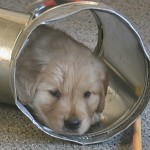
This article is not about socializing (which I discussed here).
This article is not about teaching “behaviors” to your puppy, although in the first few months I generally teach the basics: name recognition, sit, down, stand, come, stay, wait, spin, twist, speak, rollover, foot, other foot, feet up, feet off, head down, lift, mark, take, hold, give, get, hup, cover, shake, touch, press, sit-up, rise-up, left, right, easy, over, under, on-your-side, back, agility obstacles, etc.
This article is about core skills, attributes, and attitudes that will allow your dog and you to have a great relationship for decades to come. These are the things that, without even really thinking about it, we start doing with every puppy the moment they arrive, and are always surprised when we meet dogs do not seem to have spent time developing.
- Attention: I spend a huge amount of time rewarding simple eye contact. Teaching my dog to look at my eyes, to look to me for cues, to look to me when distracted, to look to me when nervous. Without attention almost no training is possible.
- Drive: I spend lots of time building the drives I want, diminishing those I do not, and refining them all to mesh with my preferences.
- Playing the game: virtually every training session I ever have with my dogs is based on the notion that we are a team working together to achieve a shared objective. My dog needs to understand that I am the leader in our team, but that I am there to help him succeed. That in every transaction, there are paths to success and reward. That if he can figure out what I want, I will give him praise and play and treats and whatever else he enjoys.
- Response contingency: I want my dogs to understand that they can control their worlds. I set up lots of situations in which they can make choices to be in the wind or not, in the light or not, on the bed or not. I want them to learn that their actions can alter and define their world.
- Problem solving: almost every day I set up problems for my puppies to solve.
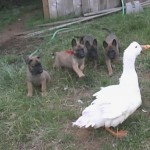
- Curiosity: I regularly introduce new items, and make sure they are fun or yummy when investigated, so he learns that novel items are worth investigating.
- Patience/self control: I want my puppy to understand delayed gratification. We do lots of Premack exercises in which I put a reward 10 feet away, but he cannot go get it until he does what I ask.
- Calmness/thoughtfulness/non-reactiveness in stimulating situations: this is closely related to socialization, but is not identical. I spend lots of times rewarding a thoughtful attitude in a challenging environment.
- Comfort in restraint: I want my puppy to be comfortable being held down, carried, or otherwise restrained. We play lots of games in which he is held, and gets released and rewarded only when he relaxes.
- Confidence: I mostly work on this when socializing, but I almost always want my dogs to be confident, so I spend a lot of time rewarding this attitude. It is MORE important to me that my dog be confident than that he has “manners” which I can always train later. So In the first year, I reinforce confidence, even if he is putting his feet up, or chewing on something or doing something that I will ultimately not want…
- Respect: I want my dog to yield to me spatially, to release things when I ask for them, etc. But training and earning respect in a young puppy must be very subtle or it will erode his self-confidence. If he is extremely self-confident, then you may spend more time on respect, if he is less confident, you may not work on respect much at all…
- Settling when asked: I want my dog to understand that there will be times when I want him to go lie down. Not play, not get into things, but just go settle. So we work on this for brief periods right from the start.
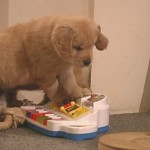
- Look where I point.
- Body awareness: I want my dogs to be aware of their rear feet, their tail, where their bodies are.
- Connectedness: I want my puppy looking for me as the center of the universe. This requires that, for many months, I be fun and interesting and warrant his focus. It also requires that I give him focus, because if your dog is looking to you for cues and you are not paying attention, he will quickly learn not to look to you.
- Enjoy a wide variety of foods.
- Play with me: I want my dog to LOVE to play, so we do it often and joyously, and we end before he gets bored. I particularly work on tug and fetch.
- Play with other dogs: many people do nothing to teach their dogs “how” to play with other dogs and are then surprised that their dog learns a style that they do not like. I spend a lot of time teaching my dogs what is preferred: lie down with small dogs, do not go harder than a certain threshold, etc.
- Bite Inhibition (for details on how I train bite inhibition, look here)
- Body position matters: sit, down, heel, on-your-side, and many other behaviors are built on the notion that the position of a dog’s body matters. So early in life I start instilling the notion that it matters whether the puppy goes under or over something, or on the left or the right, or sits or downs…
- Relationship of the dog’s position to my body or another object matter. So I play games where it matters whether the puppy is on my left or my right, is looking at me or not, is looking at a particular object, etc.
- Swimming is fun. (not merely tolerable, but FUN!)
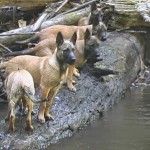
- Weather tolerance. Wet grass, cold floors, rain, snow, heat, all are fun.
- Bathing/drying/nail-clipping/toothbrushing/ear-clearing are fun: it is amazing how much more pleasant life is with a dog that genuinely enjoys standing for a bath, so spend a few hours now making it fun and pleasant, and you will thank yourself for years to come!
- Car rides are fun. (not merely tolerable, but FUN!)
- Crates are fun, moving crates are fun, loud crates are fun. (not merely tolerable, but FUN!)
- Cats and other prey animals are not to be injured.
- Collection: I really want my dogs to be able to be running and quickly collect themselves to turn or jump or transition if necessary.
- Using your nose to find things: while most dogs are naturally very scent oriented, this skill can be significantly developed in their early months. And the idea can be instilled that they need to use this skill when asked…
- Objects have names: I do not need my dog to know 500 different items by name, but I want him to understand the concept that a specific word can be associated with a particular toy.
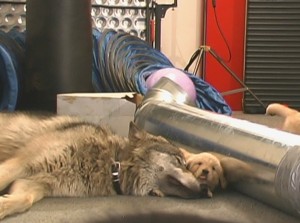 Those are the top things that I work on with a puppy in the first few months. I did not really discuss the details of “how” to work on each of them since that would have made this much, much longer, but if you want specific exercises for any of these, let me know! If you have favorite things you work on that I did not mention, let’s hear them!
Those are the top things that I work on with a puppy in the first few months. I did not really discuss the details of “how” to work on each of them since that would have made this much, much longer, but if you want specific exercises for any of these, let me know! If you have favorite things you work on that I did not mention, let’s hear them!
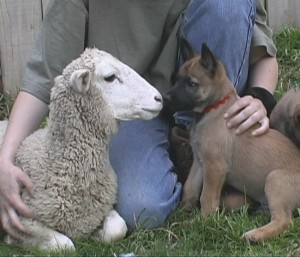
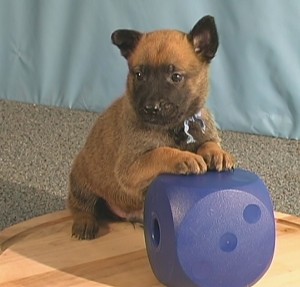

What a great list! I wish I had this posted on my refrigerator when we brought Honey home.
I’d love to see how you made swimming fun. My Golden Retriever didn’t take to water naturally and although we frolicked in the water and played with her favorite toys, we couldn’t convince her it was a good time. We even visited with other dogs who loved the water. No dice.
I’m hoping that when summer comes around again and she’s a little older, that she’ll give it a try.
But if you need a post idea, I’d love to know more about making swimming fun.
Training for pet that I have learned online was really effective for my dog. Anyone here expert on training rabbits? Would it be possible to teach my rabbit to come out from her rabbit hutches to pee? I’m willing to pay how much.
Hi, wow.. what a great blog. I wish i sought this out sooner. we have a 14 month old puggle Macie who is very friendly and we have done some “intuitive” training with– meaning unschooled, where I suspect we may have some inconsistencies. I have children ages 6, 10, 11 who enjoy doing sit, stay, rollover with Macie. But we are missing major education on how to do things properly, thoroughly, ethicallly and cooperatively. I feel like I need to make up lost ground quickly and to probably also correct some mistakes. For example, we crate trained our dog who hasn’t peed or pooped in the house in three or four months (and before that very infrequently). However the last two nights (its been raining) she’s pooped in the kitchen. I got upset this morning, put her face up to the poop, yelled at her and swatted her butt and put her outside the kitchen door to the backyard where she is let out to do her business first thing in the morning.
Anyway, can you recommend a great book that covers this subject– a simple concise guide would be best, that I can go through with the kids. Also, is there an online archive, or youtube channel of videos on these topics, training instruction, etc I can watch with my kids.
I am very much struck with your philosophy of cooperation (versus domination). It also gave me a little sinking feeling: This stuff applies just as much to child-rearing as it does to humans. I fear there has been too much domination in the raising of my kids– eg yelling and coercion to do things, versus cooperation and reward (although I may be overstating).
Anyway, I am going to print this particular blog post to start. But again, my puppy is now 14 months and I see this is for the first few months. Yet it is very concise and instructive
Thank you in advance for your kind feedback and guidance
Greg